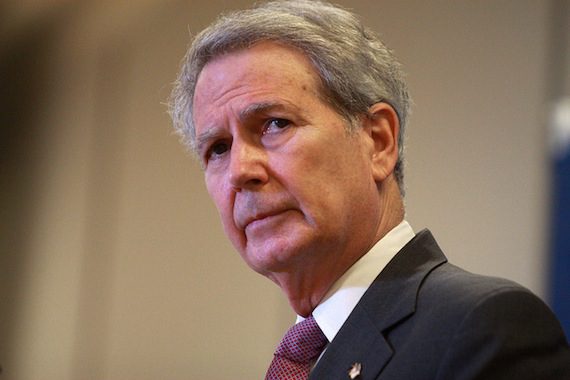Walter Jones’s Conservative Scorecard

Voters often say they would like elected officials who aren’t beholden to political bosses, who vote their conscience rather than the party line. They say they want lawmakers who think issues through carefully and who are willing to admit—and correct—errors.
This week in one East Carolina congressional district, the voters may get a chance to prove they mean it. North Carolina Republican Rep. Walter Jones is seeking his party’s nomination for an 11th term. That makes Jones a longtime incumbent, but his main challenger is no stranger to Washington: Taylor Griffin is a veteran of K Street and George W. Bush’s White House.
Although he was first elected to Congress in 1994, and his Democratic father served in the House before him, Jones is often misunderstood. Even people I usually agree with take the wrong lessons from his independence.
For example, the Washington Examiner’s Tim Carney writes, “Jones’s national security views often come across as inchoate anger boiling over from an overheated pot of disjointed opinions.” But talking to Jones or reading his letters to the families of troops who have lost their lives in the past decade’s wars, one encounters words rooted more in sorrow than anger.
Jones is an instinctively patriotic man who hails from a military-heavy district. After the United States was attacked on 9/11, he voted in favor of the military response that included going into Afghanistan to strike those who were sheltering Osama bin Laden. When the Bush administration turned its attention to Iraq, he voted to authorize that war too.
The congressman went so far as to push for French fries to be renamed “freedom fries” on congressional menus to protest France’s opposition to the Iraq war. But Jones began to have doubts about the intelligence concerning Iraqi weapons of mass destruction and he was troubled by the loss of life to which his vote contributed.
Soon Jones concluded he had made a mistake. He then did something very uncommon in Washington: he admitted it, apologized, and began to work to change the foreign policy he concluded was not in America’s national interest.
When Jones first turned against the Iraq War, very few other Republicans followed (at least publicly). So this forced the North Carolina Republican to form alliances that make conservatives uncomfortable—sometimes rightfully so. The moral gravity of what was at stake led the Baptist convert to Catholicism to speak in fire and brimstone, unsettling those used to stale Beltway niceties.
One lesson Jones took from this experience can be captured by the old bumper sticker once popular among liberals: question authority. Already someone inclined to annoy the party leadership, he became even more independent.
Jones has an economic populist streak, but his populism isn’t of the libertarian variety. This leads him to cast some votes I personally disagree with, such as his past support for some appropriations bills and sugar subsidies. But with the exception of his vote for the Dodd-Frank financial reform bill, which created a constitutionally dubious consumer bureau with little congressional oversight, the transgressions his conservative detractors point to come with much smaller price tags than the legislation he has opposed.
When the Bush administration tried to team up with Ted Kennedy on entitlements and education policy, Jones said no. He was one of just 25 Republicans to vote against the deficit-financed Medicare prescription drug benefit. He voted against No Child Left Behind.
More recently, Jones voted against a bloated farm bill. He voted against Obamacare and has voted to both repeal and defund it. He has opposed the Paul Ryan budgets from the right, not because he has wanted Congress to spend more.
Then there are the wars Jones has spent the better part of the last decade trying to end, now estimated to cost between $4 trillion and $6 trillion over the long term. It’s hard to imagine a viable primary challenge in the absence of Jones’s antiwar stands, based on earmarks and revenues from oil company leases.
Conservatives should think twice about valuing the safe predictability of cookie-cutter voting records over conscientious lawmaking—and congressmen taking the trouble to admit when they are wrong.
As the song says, sorry seems to be the hardest word.
W. James Antle III is editor of the Daily Caller News Foundation and author of Devouring Freedom: Can Big Government Ever Be Stopped?
Comments